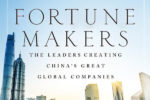
I plan to provide a theoretical framework to understand how firms actively participating in global production adjust their technology strategies in the flux of deglobalization. …Read More

I plan to provide a theoretical framework to understand how firms actively participating in global production adjust their technology strategies in the flux of deglobalization. …Read More

George Yip, author of “China’s Next Strategic Advantage: from Imitation to Innovation,” discusses the flourishing of consumer-led innovation in China and what the West can learn from it.…Read More

Read an exclusive excerpt of Fortune Makers, the new book that brings to light the distinctive practices of China’s most successful business leaders.…Read More

Fortune Makers, coauthored by the Mack Institute’s Harbir Singh, analyzes and brings to light the distinctive practices of business leaders who are the future of the Chinese economy. …Read More

The product life cycle, or time path of sales, of many high-tech goods and services is bell-shaped. I show that product life cycles endogenously arise in markets with rapid technological innovations, are heterogeneous across products, and are affected by the level of market competition.…Read More

New research by Wharton faculty Harbir Singh, Peter Cappelli, and Michael Useem reveals how Chinese business leaders are learning from their Western counterparts, and how they’re forging their own paths. …Read More

This article investigates the microeconomics underlying the spectacular growth of productivity in China’s manufacturing sector over the period 1998–2007. Underlying the aggregate evidence of such dramatic growth, one observes a large, albeit shrinking, intra-sectoral heterogeneity coupled with an even more important process of learning and knowledge accumulation.…Read More

This article investigates the impact of ownership type on the entire growth rate distributional mass of Chinese firms, using a conditional estimation approach of the asymmetric exponential power density that goes beyond simple location-shift analysis.…Read More

This paper provides the first estimates of housing price movements for Beijing in late pre-modern China. We hand-collect from archival sources transaction prices and other house attribute information from the 498 surviving house sale contracts for Beijing during the first two centuries of the Qing Dynasty (1644-1840), a long period without major wars, political turmoil, or significant institutional change in the Chinese capital.…Read More

Intellectual property piracy is widely believed, by authorities in both US industry and government, to be rampant in China. Because we lack evidence on the rate at which unpaid consumption displaces paid consumption, we know little about the size of the effect of pirate consumption on the volume of paid consumption. …Read More